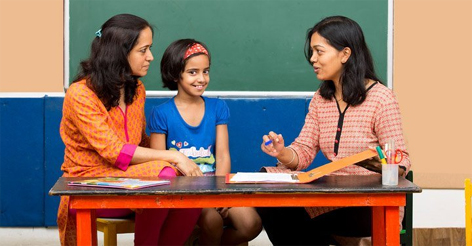Yogesh Khosla
Families and societies have never given sufficient attention to the dignity and emotional needs of the children. For many parents, parental responsibility ends with meeting children’ material needs and providing them some level of education and training. Teachers (and parents) treat children as passive recipients of knowledge and wisdom. What to say of small children, even adolescents are considered as ignorant and lacking common sense and directions are given from a higher level about do’s and don’ts. In the name of discipline and inculcation of good behavior, children are usually subjected to corporal punishment and mental harassment. Discrimination on the basis of caste, religion, status is very common.
But, things are changing fast and people are now being forced to change their attitude towards children. This article is an advocacy attempt to make teachers and parents aware of essential Child Rights and their role reversal as protectors of these rights.
India has signed United Nations Convention on the Rights of the Child (UNCRC) which gives some important rights to children. Four rights, which form the bedrock for securing additional rights, are known as “general principles”:
* All the rights guaranteed by UNCRC must be available to all children without discrimination of any kind (Article 2)
* Best interests of the child must be primary consideration in all actions concerning children (Article 3)
* Every child has the right to life, survival and development (Article 6)
* Child’s view must be considered and taken into account in all matters affecting him or her (Article 12)
Other rights guaranteed to children by UNCRC are Right to freedom of expression, Right of thought, belief and religion, Freedom of association, Right to information
In simple terms, granting these rights means that children are to be treated with dignity, provided with all essential information and to be involved and consulted before policies regarding their education, their welfare and how to discipline them etc. are framed.
Article 4 of CRC: “Governments must do all they can to make sure every child can enjoy their rights by creating systems and passing laws that promote and protect children’ rights”
Article 28(2) of CRC requires all signatory States to “take all appropriate measures to ensure that school discipline is administered in a manner consistent with the child’s dignity and in conformity with the present convention.”
As per Section 31.1 of the RTE Act, NCPCR has been given the responsibility of protecting Child Rights in India.
National Commission for the Protection of Child Rights (NCPCR) identifies the following three types of punishment in schools and at home where child rights need to be protected:-
* Physical punishment means any action that causes pain, hurt/ injury and discomfort to a child however light. This includes hitting, pinching, pulling the hair, slapping or spanking with any implement, making children assume an uncomfortable position, closing the child in an isolated space or room.
* Mental harassment is understood as any non-physical treatment that is detrimental to the academic and psychological well being of the child. It includes sarcasm, shaming, calling names, scolding using humiliating adjectives, ridiculing with regard to her background or status or parental occupation or caste.
* Discrimination is understood as prejudiced views and behavior towards any child because of her caste, gender, parental occupation or region. Discrimination includes assigning duties based on caste, deliberately neglecting or depriving the child of opportunities or participation on considerations other than merit.
Important thing to understand is that it is not only corporal punishment but mental harassment and discrimination also which are considered violations of Child Rights.
Most of us are not aware that strong legal provisions are now available against inhuman treatment and cruelty perpetrated by some teachers and parents. Here is a brief summary of the legal provisions to protect Child Rights and action against violations in the Indian context.
Legal provisions
RTE ACT (2009):
Section 17(1): No child shall be subjected to physical punishment or mental harassment.
Section 17(2): Whoever contravenes the provisions of section 17(1), shall be liable to disciplinary action under the service rules applicable to such person.
Section 32(1): State Governments and UT Administrations should designate “Local Authority” with DC as chairman and SDM as Member Secretary for redressing grievances related to corporal punishment and discrimination.
JUVENILE JUSTICE ACT (2000):
Section 23 of JJ Act-2000: ” Whoever, having the charge of or control over a juvenile or a child, assaults, abandons, exposes or willfully neglects the juvenile in a manner likely to cause him/ her unnecessary physical or mental suffering, shall be punishable with imprisonment for a term which may extend to six months or fine or with both.”
Particularly eye opening is the interpretation of JJ Act given by NCPCR- a wakeup call for parents.
According to NCPCR:
“While JJ Act is likely to be applied mostly to personnel working in childcare institutions, it arguably, applies to all who are in a position of authority over the child- parents, guardians, teachers and employers”
National Education policy-2019 (Draft) advocates zero-tolerance approach for any breach of child rights to ensure physical and emotional safety of children. It envisages following policy initiatives:-
* School safety and security of children will be a part of recognition/ affiliation of schools.
* Every Principal and teacher will be made aware of Acts, Rules and Regulations of Child Rights and what constitutes violations.
* To develop a credible mechanism for students to report breaches of rights and for appropriate action against perpetrators.
* Adolescent Education Programme (AEP) will be integrated into school curriculum so that children can act assertively when their rights are threatened or violated.
All those who love and care for children should come forward strongly to protect Child Rights and create pressure at every level and forum so that breach of these rights is not tolerated.
feedbackexcelsior@gmail.com


